VOA慢速英语 2008 0320b
时间:2019-01-11 作者:英语课 分类:VOA慢速英语2008年(三)月
THE MAKING OF A NATION - American History Series: The Constitution Goes to the States for Approval
The long struggle to give the United States a strong central government was over. It took four months to write the Constitution. It took ten more months to ratify 1 it. Transcript 2 of radio broadcast:
19 March 2008
ANNOUNCER:
Welcome to THE MAKING OF A NATION -- American history in VOA Special English.
In recent weeks, we told the story of how the United States Constitution was written. In seventeen eighty-seven, a group of delegates gathered for a convention in Philadelphia. Their plan was to rewrite the Articles of Confederation. Those articles created a weak union of the thirteen states.
Instead of rewriting the articles, however, they spent that summer writing a completely new plan of government. On September seventeenth, after four months of often bitter debate, the delegates finally signed the new document. Now, they had to get at least nine of the thirteen states to approve it. Today, Kay Gallant 3 and Harry 4 Monroe tell the story of ratifying 5 the Constitution.
(MUSIC)
VOICE TWO:
Delegates to the Philadelphia convention had met in secret. They wanted to be able to debate proposals, and change their minds, without worrying about public reaction. Now, they were free to speak openly. Each had a copy of the new Constitution.
Newspapers also got copies. They printed every word. Public reaction was great indeed. Arguments 'for' and 'against' were the same as those voiced by delegates to the convention:
The Constitution would save the United States! The Constitution would create a dictator!
VOICE ONE:
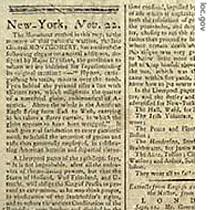
The Federalist Papers were a series of 85 essays published in newspapers in 1787 and 1788. They were written by James Madison, Alexander Hamilton and John Jay to urge citizens of New York to approve the Constitution.
The leaders who supported the new Constitution understood quickly that to win ratification 6, they must speak out. So, just a few weeks after the document was signed, they began writing statements supporting the proposed Constitution.
Their statements appeared first in newspapers in New York. They were called the Federalist Papers. They were printed under the name of 'Publius'. But they were really written by three men: Alexander Hamilton, James Madison, and John Jay.
Years later, historians said the Federalist Papers were the greatest explanation of the Constitution ever written. But in seventeen eighty-seven, they had little effect on public opinion.
(MUSIC)
VOICE TWO:
The debate over the Constitution divided Americans into two groups. Those who supported it were known as Federalists. Those who opposed it were known as anti-Federalists.
The anti-Federalists were not anti-American. They were important leaders who loved their country. They were governors, heroes of the Revolutionary War, and even a future president. Yet they distrusted the idea of a strong central government.
Give too much power to the president, the Congress and the courts, they said, and citizens would no longer be free. They would lose the liberties gained in the war for independence from Britain.
VOICE ONE:
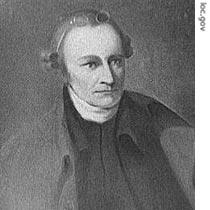
Patrick Henry
One anti-Federalist was Patrick Henry of Virginia. James Madison called him the most dangerous enemy of the Constitution.
Patrick Henry and other anti-Federalists tried to create distrust and fear about the new plan of government. Farmers against city people. North against South. Small states against big states.
An anti-Federalist newspaper in Philadelphia carried this commentary: "Citizens! You are lucky to live in Pennsylvania, where we have the best government in the world. Do not let this government be destroyed by the new Constitution. Do not let a few men -- men with great names -- seize control of your lives."
One Federalist noted 7 that it was easier to frighten the people than to teach them.
VOICE TWO:
There were both Federalists and anti-Federalists in the Continental 8 Congress. The Congress had few powers. But it was the only central government the thirteen states had at that time. It met in New York City.
The convention in Philadelphia had sent the Continental Congress a copy of the new Constitution. Within eight days, the Congress agreed that each state should organize a convention to discuss ratification. One by one, the states held their conventions.
VOICE ONE:
Delaware was the first state to ratify, early in December, seventeen eighty-seven. All the delegates voted to approve it. Pennsylvania was the next to ratify, also in December.
New Jersey 9 ratified 10 the Constitution in December, followed by Georgia and Connecticut in January. That made five states. The Federalists needed just four more to win ratification.
Massachusetts voted in early February. Delegates to the state convention wanted the Constitution amended 11 to include guarantees to protect citizens' rights. They agreed to ratify if these guarantees were added later.
VOICE TWO:
Maryland ratified the Constitution at the end of April. There, a number of delegates included a letter of protest with their vote. They said if the proposed plan of government were not amended, the liberty and happiness of the people would be threatened.
South Carolina became the eighth state to ratify, at the end of May. Just one more state and the new Constitution would become the law of the land. All eyes turned to Virginia.
(MUSIC)
VOICE ONE:
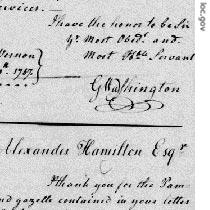
In this letter to Alexander Hamilton, George Washington thanks Hamilton for sending a copy of the Federalist Papers written by "Publius"
Virginia was the biggest of the thirteen states. At that time, its western border stretched all the way to the Mississippi River. One-fifth of all the people in America lived in Virginia. The men who attended the ratifying convention were among the most famous names in the nation: James Madison, Patrick Henry, George Mason, James Monroe, Edmund Randolph and John Marshall.
Thomas Jefferson was still in Paris, serving as America's representative to France. But others kept him informed of everything that happened at home. Jefferson wrote back that he liked most of the Constitution. But, he said, I do not like the fact that it does not contain a declaration of the rights of citizens.
The most famous Virginian, George Washington, stayed at his farm, Mount Vernon. All during the month of June, however, riders brought him messages from the convention and carried messages back.
VOICE TWO:
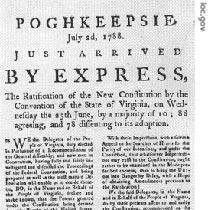
The Convention of the State of Virginia ratified the Constitution on June 25, 1788
For three weeks, the Virginia delegates argued about the Constitution. By the end of June, they were ready to vote. Patrick Henry, the outspoken 12 anti-Federalist, asked to make a last statement.
"If this convention approves the Constitution," Henry said, "I will feel that I fought for good reasons…and lost the fight. If this happens, I will wait and hope. I will hope that the spirit of the American Revolution is not lost. I will hope that this new plan of government is changed to protect the safety, the liberty, and the happiness of the American people."
Then the convention voted. Virginia approved the Constitution. However, like Massachusetts, it added that the document must include a declaration of rights for the nation's people.
VOICE ONE:
Federalists in Virginia were proud. They thought their state was the ninth to ratify, the one that made the Constitution the law of the land. But they soon learned that New Hampshire had ratified a few days earlier. Virginia was number ten. That left three states: North Carolina, Rhode Island, and New York.
In a way, New York was the most important of all. If New York refused to join the union under the Constitution, it would be almost impossible for a central government to rule the nation. The twelve other states would be divided in two, geographically 13 separated by New York state.
VOICE TWO:
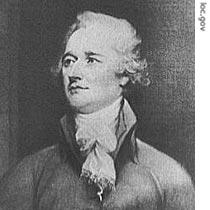
Alexander Hamilton
The Federalists were led by Alexander Hamilton. They used their right to filibuster 14 -- to make many long speeches -- to delay the vote. They wanted to wait to hear what Virginia would do. Early in July, they got the news. But New York's anti-Federalists kept up the fight for three more weeks.
It was not until the end of July that New York finally ratified the Constitution. The vote was extremely close: thirty to twenty-seven. Like Massachusetts and Virginia, New York demanded a declaration of rights.
VOICE ONE:
The long struggle to give the United States a strong central government was over. It took four months to write a new Constitution. It took ten months to ratify it.
The Continental Congress declared that the Constitution would become effective the first Wednesday in March, seventeen eighty-nine. The last two states -- North Carolina and Rhode Island -- did not ratify it until many months after that date.
Benjamin Rush of Pennsylvania, who had signed the Declaration of Independence, wrote down eight words when he heard that the Constitution had been ratified. "It is done," he said, "we have become a nation."
(MUSIC)
ANNOUNCER:
Our program was written by Christine Johnson. The narrators were Kay Gallant and Harry Monroe. Join us again next week for THE MAKING OF A NATION -- an American history series in VOA Special English.
- The heads of two governments met to ratify the peace treaty.两国政府首脑会晤批准和平条约。
- The agreement have to be ratify by the board.该协议必须由董事会批准。
- A transcript of the tapes was presented as evidence in court.一份录音带的文字本作为证据被呈交法庭。
- They wouldn't let me have a transcript of the interview.他们拒绝给我一份采访的文字整理稿。
- Huang Jiguang's gallant deed is known by all men. 黄继光的英勇事迹尽人皆知。
- These gallant soldiers will protect our country.这些勇敢的士兵会保卫我们的国家的。
- Today,people feel more hurried and harried.今天,人们感到更加忙碌和苦恼。
- Obama harried business by Healthcare Reform plan.奥巴马用医改掠夺了商界。
- They call their State Assembly a disgrace for ratifying the 35th. 他们把州议会通过的第35号修正案说成是可耻的行为。 来自辞典例句
- The Obama administration, unlike its predecessor, talks of ratifying the test-ban treaty. 该会议五年举办一次,回顾其间发生的事情。 来自互联网
- The treaty is awaiting ratification.条约正等待批准。
- The treaty is subject to ratification.此条约经批准后才能生效。
- The local hotel is noted for its good table.当地的那家酒店以餐食精美而著称。
- Jim is noted for arriving late for work.吉姆上班迟到出了名。
- A continental climate is different from an insular one.大陆性气候不同于岛屿气候。
- The most ancient parts of the continental crust are 4000 million years old.大陆地壳最古老的部分有40亿年历史。
- He wears a cotton jersey when he plays football.他穿运动衫踢足球。
- They were dressed alike in blue jersey and knickers.他们穿着一致,都是蓝色的运动衫和灯笼短裤。
- The treaty was declared invalid because it had not been ratified. 条约没有得到批准,因此被宣布无效。
- The treaty was ratified by all the member states. 这个条约得到了所有成员国的批准。
- He was outspoken in his criticism.他在批评中直言不讳。
- She is an outspoken critic of the school system in this city.她是这座城市里学校制度的坦率的批评者。
- Geographically, the UK is on the periphery of Europe. 从地理位置上讲,英国处于欧洲边缘。 来自辞典例句
- All these events, however geographically remote, urgently affected Western financial centers. 所有这些事件,无论发生在地理上如何遥远的地方,都对西方金融中心产生紧迫的影响。 来自名作英译部分
- A senator dragged the subject in as a filibuster.一个参议员硬把这个题目拉扯进来,作为一种阻碍议事的手法。
- The democrats organized a filibuster in the senate.民主党党员在参议院上组织了阻挠议事。